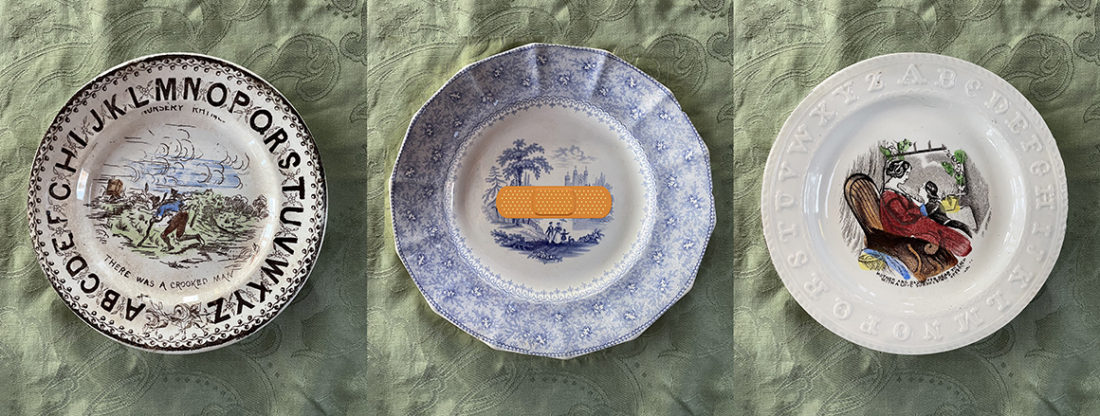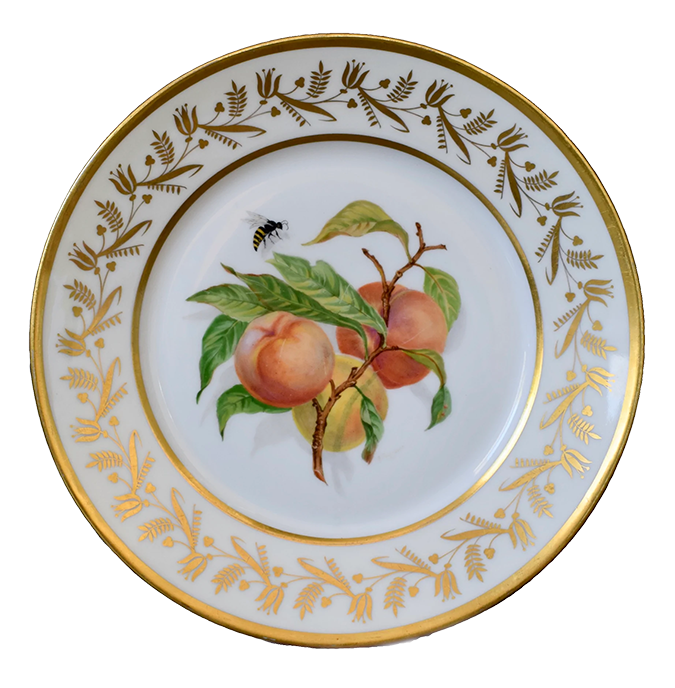Shall I part my hair behind? Do I dare to eat a peach?
I shall wear white flannel trousers, and walk upon the beach.
–T.S. Eliot, “The Love Song of J. Alfred Prufrock”
One year into the CoVid lockdown I may dare to eat a peach, but I do not dare to enter the grocery store where I might purchase one. Nor do I dare leave the choosing of my peaches to the whims of the in-store shopper who assembles my order. Clementines are more predictable. The bags are left chastely on my porch, a contact-free service of which J. Alfred would no doubt approve, his contact-free existence being somewhat the point of the poem.
I was measuring out my life with coffee spoons long before the pandemic turned us all into tremulous Prufrocks. Quarantine just makes the quotidian unequivocal. My husband and 26-year-old daughter are cooped up with me. Not to complain. We have plenty of space, we have plenty of plenty, which again is rather the point of the poem. J. Alfred sports a morning coat, and a necktie rich and modest. Fancy. He eats tea and cake and ices. Also fancy. But when push comes to shove J. Alfred falls short. At life’s crucial juncture he falters; he lacks the strength to force the moment to its crisis. Did the banality of material comfort cause the stultifying torpor of Prufrock’s soul? I’d say yes, at least in part.
I am extremely grateful. I know my torpor in the face of a global health crisis is a luxury and that to complain about it would be an act of almost unforgiveable self-absorption. In the room the women come and go talking of Michelangelo. I have mail-order wine and Netflix and a reasonably functional family. Husband and daughter at home, son just a few miles away. By any measure my discomforts and disappointments are small.
But so is life these days. Small. I am 61, and my world began to shrink months before the pandemic began, following surgery which kept me from dying but left me with significant mobility limitations. I was already retired from work and my children were grown, first steps in the creeping contraction of my day-to-day. After the surgery I did what I could. I taught refugees, I studied French, I went out to lunch with the many true-blue friends who were willing to pick me up, as I can no longer drive. Those were the coffee spoons of my post-surgery life, and I savored them.
At a certain age all our lives diminish; last summer’s surgery merely forced the moment to its crisis, so to speak. We all grow smaller, in height, in importance. Just a few years ago I was a lawyer who represented refugees seeking political asylum. By the time of my surgery I had stopped practicing law but I was still working with refugees, helping them learn English, teaching them how to count change or ride the bus. It was not much, but it was something. Since the pandemic even that small work is gone. I have seen the moment of my greatness flicker. The international center has shut down all but its most essential services, and what I have to offer is not essential.
I grow old … I grow old …/I shall wear the bottoms of my trousers rolled.
I read “The Love Song of J. Alfred Prufrock” in 11th grade English class, when I was 16 and life was all possibility and expectation. I would live in Paris, I would fall madly in love, I would write novels and also be an ambassador. Strange that Eliot’s achingly brilliant ode to moral lassitude and failed chances could ring so true, even then. “Love Song…” became my favorite poem (an easy choice when you don’t know many), and resonates even more now that my own life contains a hundred indecisions, a catalogue of moments where I failed to dare: to spend a summer as a camp counselor in France; to submit an application to the Peace Corps; to accept an interview with the Asian Wall Street Journal because my husband and I had already decided to move to Colorado. J. Alfred claims there will be time, time for a hundred visions and revisions; but I know now that he is wrong.
And in the end J. Alfred knew, too, his final, devastating self-awareness being in part the point of the poem. I have heard the mermaids singing, each to each.//I do not think that they will sing to me. How sad it is to face our limitations, especially when the limitations themselves seem ordinary and unimportant. Life has not been everything I imagined in 11th grade, but I have enjoyed a family and a home and the freedom to choose between working or being a lady who talks of Michelangelo. I did not dare to eat all the peaches life offered me, but I have not gone hungry.
And this latest pre-pandemic cutting off of possibility has in the end lacked drama as well. There was the crumbling of my spine and attendant surgery to save my spinal cord by installing metal from my skull down through my shoulder blades. I have seen the eternal Footman hold my coat, and snicker. I can no longer drive, or ride a bicycle, or nod my head to indicate yes or no. My arms are weaker than they used to be and I lean on the rail when I walk down stairs because I can not look down to see where I am stepping. The back of my head feels numb and tight, my upper back hurts when I rest on our sofa or walk too far. These are not complications; these were the expected results.
To friends and family, however, I am a marvel of cheer and resilience. They tell me I look fabulous and all things considered I do not disagree. One must after all take time, time to prepare a face to meet the faces that you meet. I prepare. People do not know what it is like to live in my body and I do not want to tell them. Oh, do not ask, “What is it?”/Let us go and make our visit. I am grateful, grateful that I have friends who visit, even if I cannot turn my head to look at them when we walk side by side.
My life was already shrinking. When CoVid brought the walls in closer it did not seem like much. After my surgery I discovered a French conversation group that meets once a week at a nearby junior high school. I will not live in Paris, as I once dreamed. I no longer represent political asylum clients from francophone Africa. But this group opened a door, after so many had closed. Suddenly, new people, a chance to speak French.
When the quarantine shut down the junior high, the conversation group continued to meet online. These days I spend an inordinate amount of time reading French books and practicing grammar on a French website. I watch French TV on Netflix. If I think about it, there is no point. Now that CoVid has put the damper on international travel, I can’t even plan a study tour or extended trip to France, at least not for the foreseeable future. The circle of possibility grows smaller: Tuesday nights, a grid of faces in a French class meeting on Zoom. The mermaids will not sing to me; they certainly will not sing in French. But I soldier on, with ineffable joy.
My body will continue to crumble. I am happy/grateful/lucky that I survived last summer’s surgery. I am aware that even my limited mobility may not last for long. I am pinned and wriggling on the wall. Aren’t we all, Mr. Prufrock? I do not want to waste a minute even though there is nothing to do. And so it is for everyone, now that CoVid has simultaneously given and robbed us of time.
Some view the quarantine as a gift. A gift of time, time for all the works and days of hands. Others bemoan the thwarted plans, the visits and trips and celebrations that will not take place. And we are the privileged, the ones who take tea and cake and ices. The ones with the luxury to complain about empty days. The ones who do not have to worry about jobs lost or families ruined or any of the other myriad human tragedies that even a pandemic cannot abate. The afternoon, the evening, sleeps so peacefully! I am frantic to begin filling in my next few years.
What is left, in the end, but coffee spoons? I have known them all already, known them all:/Have known the evenings, mornings, afternoons,/I have measured out my life with coffee spoons. It is the most famous line of the poem, more famous than the peach, I think.
Our daughter returned from overseas just as the pandemic was settling in. Weekly cocktail hours were her idea. Our son, quarantined across town in his studio apartment, comes over to join us. Friday afternoons, a focal point in the week, something to plan and look forward to. We are working our way through a list of classic cocktails. We rate each drink and keep a record of our results. We started with Negronis, which no one really liked. Old Fashioneds the next week were better. I research the history of each drink. Bloody Mary—named after the 16th century English queen or the silent film star Mary Pickford? It gives us something to talk about, a bit of a ritual.
We prepare food each week to match the drinks. Pimento cheese and bacon-deviled eggs on Whiskey Smash night; pierogis and herring with the Moscow Mules. For the Aperol Spritzes we had prosciutto and arugula finger sandwiches with aioli that my daughter whisked by hand. She is a perfectionist, a hard worker and an artist. Each week her efforts are more elaborate and more beautiful. Each week when everything is prepared and set out on the table, I take a picture.
I was scrolling through the pictures on my phone the other day, and saw that for months, there has been very little to photograph except these cocktail hours. The photos are arranged by date and there is almost nothing except Fridays, with my living room coffee table laden with fancy appetizers and four cocktails garnished, chilled, ready to drink. When I first saw the pictures, I laughed. Oh my God, I thought, this is all I’ve done for months. I can measure time by these pictures. Coffee spoons.
The thing is, the pictures are beautiful. The table where everything is set out is a long rectangle. I position the cocktails in front. The contour of the four glasses varies each week: champagne flutes, stubby lowball glasses, long-stemmed inverted cones for martinis, heavy goblets with rims of different colors that we used for margaritas. Platters of food stretch out behind the drinks: concentric circles of deviled eggs; rhomboid finger sandwiches arranged on an oval platter; chevrons of cheese and meats overlaid with clusters of grapes or dried fruits. Reds and browns and yellows and greens.
I take the pictures quickly. By the time everything is ready we are impatient, and I don’t want our drinks to get warm or the ice to melt. I have learned it is a question of angle. If I shoot from too high the food looks luxurious but the drinks are just four circles, you miss the shape of the stemware and the glass and liquid sparkling in the light. But if I shoot from too low, the food flattens into the horizon, and you lose all its patterns and colors.
I position my phone somewhere in between. I take my pictures and then we each take a glass. Another week. Life is small, but possibilities remain.
- Cocktail Hour - August 24, 2022

